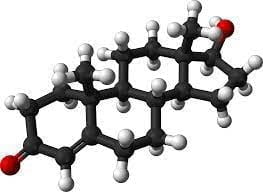There’s much more to breathing than moving air in and out of your lungs. It has a direct impact on how your body manages hormones like testosterone, cortisol, and melatonin and indirectly impacts others. These hormones control energy, stress, recovery, and sleep. Nasal breathing supports better hormone health.
In the sections ahead, we’ll take a look at how nasal breathing impacts hormonal health. We also look at why this matters for the long-term.

Cortisol and Stress Balance
While Cortisol is often called the “stress hormone”, this is a limited way to look at it. It is also necessary for regulating metabolism and controlling information. It manages energy and sustains focus. The problem with cortisol levels is when they are high. Not just for a short period but for an extended period of time and don’t come back down. This continuous surge drains energy, weakens the immune system and disturbs other hormones.
Nasal breathing keeps cortisol levels low by calming the nervous system and increasing signals for calm. It works like this:
- Light slow breathing lowers the stress response – Slow nasal breathing activates the parasympathetic system, which signals the body to relax.
- Prevents regular high cortisol levels – slow, regular nasal breathing decreases the stress impact that comes from shallow mouth breathing.
- Safeguards other hormones – lower sustained cortisol supports better testosterone production and increase of melatonin at night.
- Keeps energy steady – With a smaller stress impact, your energy levels stay more constant throughout the day.
With regular lighter and slower breathing from the nose, your body is able to naturally reduce stress and sustain long term hormone health.

Melatonin and Better Sleep
Melatonin is a hormone that lets you know it’s time to sleep. It increases in the evening in order to help you fall asleep and stay asleep throughout the night. When in balance, Melatonin helps allow for greater recovery, a stronger immune system and a better mood the next day. With poor breath, particularly through the mouth and from the chest, you can negatively impact the natural production of melatonin.
Breathing properly, through the nose, helps melatonin production by supporting the right conditions for falling into sound sleep. Here’s how this works:
- Promotes natural circadian rhythm – Slow, light nasal breathing is in alignment with the body’s natural circadian cycle, supporting the rise of melatonin in the evening.
- Keeps airways open – Proper breathing through the nose decreases snoring and other sleep disruptions that can impact melatonin production.
- Allows nitric oxide production – Nitric oxide produced in the nose increases oxygen delivery, helping the brain and body fall into deep sleep which is needed for recovery.
- Helps lead to deeper rest – Steady breathing allow for a deeper sleep, staying in Deep and REM sleep, which allow for optimal repair and hormone release.
Through regular nasal breathing, through your nose, especially while asleep, you help your body release melatonin naturally. This change to better breathing improves your sleep and allows for better hormone balance.

Testosterone and Recovery
Testosterone is necessary for male strength, energy and drive. It increases while you sleep and after periods of recovery but is negatively impacted by stress and poor breathing. Mouth breathing increases the stress hormone cortisol. This disturbs sleep and decreases oxygen delivery to the cells which, in turn, impacts testosterone production and balance.
Nasal breathing supports the right environment for testosterone to stay healthy. Here’s how:
- Better oxygen absorption for muscles – Nasal breathing boosts nitric oxide and encourages a slightly higher amount of carbon dioxide, both of which widen blood vessels. Wider blood vessels improve circulation so muscles repair faster after exercise, which triggers testosterone release.
- Deeper, uninterrupted sleep – Testosterone increases during Deep sleep (slow brain wave sleep). Breathing through the nose reduces snoring and disruptions to sleep, allowing your body to stay longer in that stage of sleep.
- Lower stress response at night – Shallow mouth breathing increases heart rate and stress hormones while you sleep, which reduces testosterone production. Since nasal breathing calms down the nervous system this allows testosterone production to stay on track.
- Improved workout recovery – With nasal breathing more oxygen reaches muscle tissues, which creates a stronger signal for repair and growth, helping testosterone to work as needed.
Ensuring consistent nasal breathing during the day and night, you provide the conditions your body needs for producing healthy testosterone levels and allowing for quicker recovery.

Other Hormones Influenced by Nasal Breathing
While nasal breathing more directly influences cortisol, melatonin and testosterone, there are a few other hormones it also affects that influence energy, metabolism, recovery, and repair. These benefits are directly related to breathing better which increases oxygen delivery to the cells, calming the nerves, and improving sleep.
- Human Growth Hormone (HGH) – This hormone is released mainly during deep sleep, HGH helps muscle repair, metabolizing fat, and healing tissue. Because nasal breathing improves sleep quality, it also give the body more time to release HGH.
- Insulin – Regular nasal breathing reduces stress which reduces blood sugar spikes. With steadier oxygen and lower cortisol, the body uses insulin more effectively, decreasing the risk of insulin resistance [1].
- Thyroid Hormones (T3 and T4) – Stress negatively impacts thyroid activity by increasing cortisol, which interferes with thyroid hormone production. By lowering stress through nasal breathing, thyroid hormones work in a more balanced way, which results in a more efficient metabolism and steady energy [2].
- DHEA (Dehydroepiandrosterone) – Known as a “protective” hormone, DHEA balances cortisol and supports immune health. Calm nasal breathing creates a hormone environment where DHEA remains at a higher level [3].
Because these hormones are indirectly impacted by better breathing they aren’t usually mentioned. But they play a huge role in how your body repairs itself, stores energy and remains resilient. With regular, consistent nasal breathing you support a network of hormones to keep your system in balance.
Breathing and Hormone Rhythms for Better Hormone Health
Your body has a natural 24 hour cycle called the circadian rhythm. Through this cycle hormones rise and fall throughout the day to provide the energy, sleep and recovery needed. Bad breathing patterns impact the timing of this cycle while nasal breathing keeps your hormone levels steady.
Here’s how nasal breathing supports your daily hormone levels:
- Morning cortisol increase – Cortisol peaks early in the morning to wake you up.. Better nasal breathing prevents this rise in cortisol from becoming too excessive, ensuring you have steady alertness instead of an overload in stress.
- Daytime energy and focus – better breathing, improving oxygen intake which supports better metabolic health, allows efficient use of glucose so your energy levels stay stable between meals.
- Melatonin increase during the evening– Better breathing through slower, lighter nasal breathing helps calm the nervous system This helps in the evening, allowing melatonin to increase naturally, relaxing you further, getting you ready for sleep [4].
- Growth and repair – While asleep, nasal breathing decreases airway resistance and keeps oxygen levels steady. This supports the release of testosterone, growth hormone, and DHEA.
When your breathing supports your circadian rhythm, hormones stay in balance. This cycle keeps your focus, sleep and recovery in balance for long term health.
Conclusion: Nasal Breathing for Better Hormone Health
Breathing better has a lot to do with better hormone health and not just simply better airflow. By reducing stress levels, improving sleep quality, and improving oxygen absorption, this better controls cortisol, melatonin, testosterone and indirectly other key hormones. As a result you have more energy throughout the day, increased focus, and sounder sleep, which increases recovery. Mouth breathing does the opposite – it robs you of energy, sleep, and the recovery your body and brain rely on each time you sleep.
A small change to your breathing habits can positively impact your health in a big way – regulating your hormones allows you to regain your edge.
Check out What Functional Breathing Actually Means.







